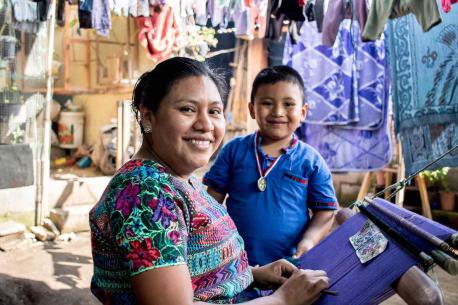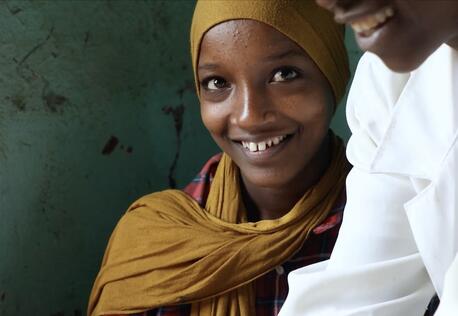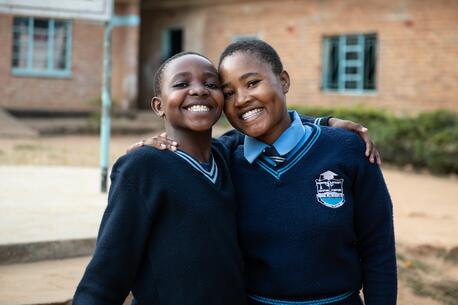
Celebrating the World’s Artisans and the Power of Shopping for Good
UNICEF Market celebrates the talented makers who create everything from one-of-a-kind pieces of fine art to clothing lines and home decor that lend beauty and style to everyday essentials. We at UNICEF USA are especially grateful to the artisans of UNICEF Market.
Their commitment to their craft preserves invaluable cultural and artistic traditions. The jobs they create support families in some of the very places where UNICEF works. A portion of proceeds from the beautiful products they sell support UNICEF's lifesaving programs for the world's most vulnerable children.
A better world for artisans is a better world for all.
Here, meet a few of these talented sculptors, weavers, textile artists and silversmiths and learn more about how they and UNICEF are making the world a better place.

West African wood carver Ernestina Oppong Asante (seated, above right) started out selling her traditional African drums, masks and sculptures along the roadside in her native Ghana. But today, thanks to her creations' brisk online sales through UNICEF Market and other platforms, she now owns a shop. She has also realized another lifelong dream: a house of her own and education for all her children.
Asante embodies the resilience and versatility that helps sustain artisans as they grow their small businesses against the odds. Trained as a dressmaker, she realized that there wasn't a market for her goods, so, defying gender barriers, she turned her attention to sculpture, an artform in greater demand.
"Carving has long been regarded as the preserve of men," explains Asante. "I'm glad that I have been able to infiltrate the medium but also to make an impact on the trade."
The impact her business has had on her village is notable as well. Asante now employs other carvers, including her husband Daniel Asante (seated, above center) who is a UNICEF Market artisan in his own right. Building on her success, Asante has even returned to her textile roots — creating intricate threadwork pieces featuring Adinkra and Sankofa symbols, as her homage to the Akan-speaking peoples of southern Ghana and its neighbor to the west, Côte d’Ivoire.

To create traditional Balinese jewelry, Indonesian artisan Komang Wijayana (above) deploys fire, raw materials native to his home in Indonesia and the patience he learned from watching his own parents, who come from a line of master jewelers that stretches back to 1982. There is a deep cultural history attached to Wijayana's jewelry line, which draws from Bali's ancient tradition of intricate filigree and the inspiration of the artist's natural surroundings.
"When I was 10, my parents told me to learn about silver jewelry because someday, when I got older, I'd be able to make a living from this skill,” recalls Wijayana. “They taught me everything. Their love for their work made me love this world of jewelry.”
Wijayana's birthplace in Celuk is considered a mecca of silversmithing. But the coronavirus pandemic gave his country another dire distinction. Of all Southeast Asian countries, Indonesia has been hit the hardest by COVID-19. While the pandemic's shocks have affected people of all ages, children and adolescents have been hit especially hard by falling household incomes.
In 2021 alone, a significant backslide in routine childhood immunization caused by COVID-19 meant that 25 million children missed out on one or more doses of the vaccine against diphtheria, tetanus and pertussis (DTP3). This is two million more than those who missed out in 2020 and six million more than in 2019.
But with UNICEF and partners' support, Indonesia's Government is working tirelessly to reach as many children as possible, including those who live in disadvantaged and remote areas.

Meena Ughrejia (above) grew up in Chandigarh, India, watching her mother create beautiful patchwork quilts from the family's old clothes and fabric swatches they had around the house. She couldn’t help but learn the art, and when she got older and married a man whose family had turned this traditional craft into a thriving business, she vowed to hone her skills.
She and her husband began building their own business and as the popularity of their designs grew, so did their operation. They took on more employees and offered work to other artisans in their community when larger orders started to come in.
Most of the fabric they use comes from Gujarat and Delhi. But they also source fabrics from a women's group that goes door to door collecting clothes in exchange for new utensils — a common practice in India’s small towns that lends meaning to Meena’s work:
"What I love about my art is the coming together of colorful patches into one single panel – it's like putting together dreams of many women who once wore the garments. This shows that tradition never dies."
Such traditions have offered comfort in India since the coronavirus pandemic began. India is second only to the U.S. in number of confirmed cases — 31.4 million as of April 15 — with 173,123 deaths, according to the Johns Hopkins Coronavirus Resource Center. To make ends meet, many poor families turn to child labor or leave their children in the care of others while they migrate in search of work. In addition, over 20 million children have suffered through floods, drought, cyclones and other hazards that are exacerbating underlying vulnerabilities.
Since the pandemic began, UNICEF has shared information on how to stay safe from the coronavirus with more than 650 million children and their families and reached over 3.1 million people across the country with critical water, sanitation and hygiene supplies and services. And on January 16, nearly one year after India reported its first case, a 34-year-old sanitation worker at Delhi's All India Institute of Medical Sciences (AIIMS), became the first person to receive the COVID-19 vaccine. So began India's largest vaccine drive and its journey on the road to recovery from a pandemic that has touched millions of lives.

In the Maya language, K'amolon K'i K'ojonel means "Let's get together." It is also the name of an association founded in 1987 to provide assistance and support to women in Sololá whose husbands died during Guatemala's armed conflict.
Since its founding, K'amolon K'i K'ojonel (above) has grown from a noble intention to a thriving association run by women for women who all make their living — and beautiful handwoven accessories — using the traditional backstrap loom. The collective pursues a mission neatly expressed by its motto: "Weaving a Better World." Every day, its 200 members do just that as they preserve a traditional art form that supports their families and produces richly colored hand-dyed scarves, bags, and wraps treasured worldwide.
Artisans from Guatemala like the women of K'amolon K'i K'ojonel have been sorely tested since the pandemic began. But even before COVID-19 hit, the countries of Central America already faced significant humanitarian needs related to people migrating to flee violence, internal displacement, food insecurity and poverty. It's estimated that the pandemic could push 10 million additional people into poverty, leaving millions of children dependent on humanitarian assistance.
UNICEF is now working to provide relief to hundreds of thousands of people — families and children who are on the move and those struggling to survive COVID-19's impacts at home. UNICEF is also focused on getting children safely back to school, providing nutritional support and the necessary sanitation and hygiene services and supplies to allow children, families and frontline health workers to protect themselves and others from the spread of COVID-19.
To the artisans whose livelihoods have suffered this past year and to the children their UNICEF Market sales help support, your purchase matters — today and every day.
Top photo: Mayra Leticia Hernandez (above with her son) learned how to weave growing up in San Antonio Palopó, Guatemala, from her mother, who created beautiful textiles on a backstrap loom.
HOW TO HELP
There are many ways to make a difference
War, famine, poverty, natural disasters — threats to the world's children keep coming. But UNICEF won't stop working to keep children healthy and safe.
UNICEF works in over 190 countries and territories — more places than any other children's organization. UNICEF has the world's largest humanitarian warehouse and, when disaster strikes, can get supplies almost anywhere within 72 hours. Constantly innovating, always advocating for a better world for children, UNICEF works to ensure that every child can grow up healthy, educated, protected and respected.
Would you like to help give all children the opportunity to reach their full potential? There are many ways to get involved.





